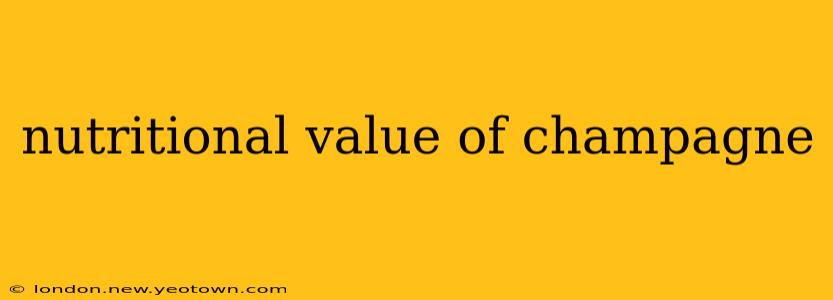The Sparkling Truth: Uncorking the Nutritional Value of Champagne
Champagne. The very word conjures images of celebration, romance, and sophisticated gatherings. But beyond the celebratory bubbles, lies a surprisingly nuanced nutritional profile. While not a health food in the traditional sense, understanding the nutritional value of champagne can help you enjoy it responsibly and mindfully. This isn't about depriving yourself of pleasure, but rather about making informed choices. Let's pop the cork and delve into the details.
What are the Calories in Champagne?
A typical 5-ounce (150ml) glass of champagne contains roughly 80-100 calories. This can vary slightly depending on the brand and sweetness level. Those opting for sweeter varieties, like Demi-Sec or Doux, will find a slightly higher calorie count due to the added sugar. This means a celebratory bottle shared amongst friends results in a relatively moderate calorie intake, but moderation is still key, especially if watching your overall daily calorie consumption.
Does Champagne Contain Sugar?
Yes, champagne does contain sugar, but the amount varies dramatically depending on the type. Brut, the most common type, is considered "dry" but still has a small amount of residual sugar (typically 0-12 grams per liter). Sweeter styles like Demi-Sec and Doux contain significantly more residual sugar. For those watching their sugar intake, Brut is the most sensible choice, but even then, remember that moderation is key.
Are There Any Vitamins or Minerals in Champagne?
Champagne isn't a significant source of vitamins and minerals. It primarily contains water, alcohol, and small amounts of naturally occurring compounds from the grapes. While trace amounts of minerals may exist, they are not in quantities that significantly contribute to your daily nutritional needs. Don't rely on champagne to boost your vitamin intake!
Is Champagne Good for Your Health?
The health effects of champagne, like any alcoholic beverage, are complex. Moderate consumption has been linked to potential cardiovascular benefits in some studies, possibly due to the presence of antioxidants in the grapes. However, excessive consumption can lead to several health problems, including liver damage, weight gain, and increased risk of certain cancers. Always drink responsibly and in moderation.
What are the Potential Health Risks Associated with Drinking Champagne?
Excessive champagne consumption carries the same risks as excessive alcohol consumption in general. These include:
- Liver damage: Over time, heavy alcohol consumption can lead to cirrhosis and other liver diseases.
- Weight gain: The calories in champagne, combined with potential increased appetite, can contribute to weight gain.
- Increased risk of certain cancers: Studies have linked heavy alcohol consumption to an increased risk of various cancers.
- Health complications during pregnancy: Alcohol consumption during pregnancy can have serious consequences for the developing fetus, including fetal alcohol syndrome.
Does Champagne Have Any Antioxidants?
Yes, champagne does contain some antioxidants, primarily from the grapes used in its production. These antioxidants are believed to contribute to some of the potential health benefits associated with moderate alcohol consumption. However, it's crucial to remember that consuming champagne to reap these benefits is not a recommended approach. A balanced diet rich in fruits and vegetables is a far more reliable source of antioxidants.
In conclusion, while champagne provides minimal nutritional value beyond calories, its moderate consumption, as part of a balanced lifestyle, may not be inherently detrimental. The key takeaway is moderation. Enjoy this celebratory beverage responsibly, savoring its unique flavor profile without compromising your health. Remember, a little indulgence is fine, but making healthy choices the majority of the time is paramount for overall well-being.

